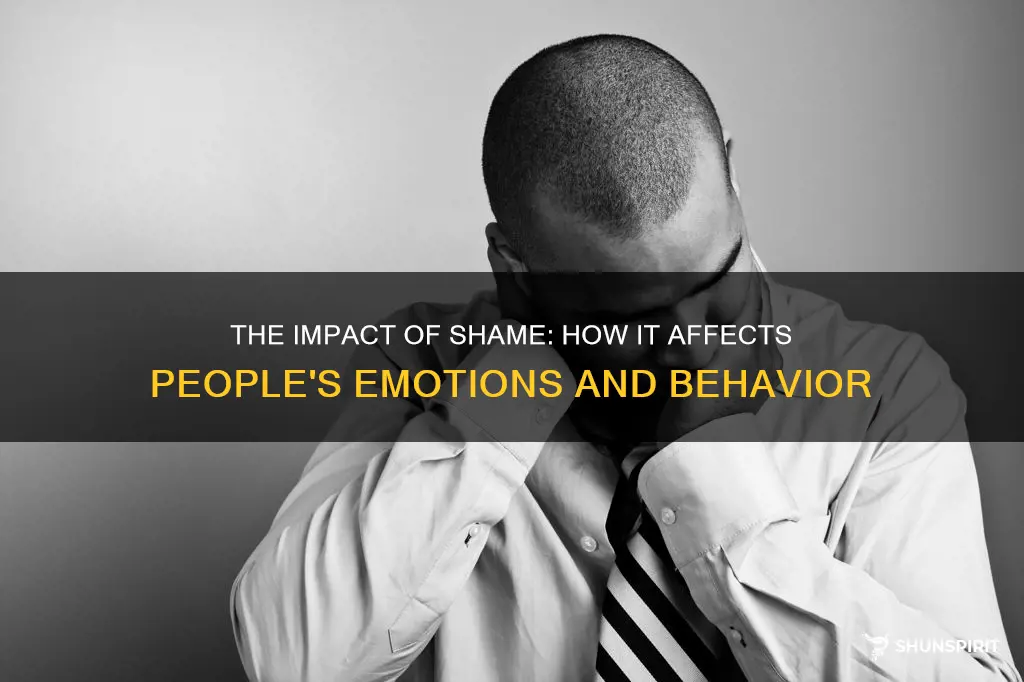
Shame is an emotion that often lurks in the shadows, silently impacting individuals in profound and complex ways. From childhood memories of being scolded or chastised, to the societal expectations and judgments we face as adults, shame can shape our beliefs, attitudes, and behaviors. It is a visceral response, triggered by feelings of inadequacy, humiliation, or embarrassment, and has the power to dismantle self-esteem and confidence. Understanding the impact of shame allows us to delve into the depths of human psychology, exploring how this emotion can influence our relationships, choices, and overall well-being.
| Characteristics | Values |
|---|---|
| Physical reactions | Blushing, sweating, trembling, feeling hot |
| Cognitive effects | Negative thoughts, self-criticism, self-doubt |
| Behavioral changes | Avoiding eye contact, withdrawing from social situations |
| Social consequences | Feeling isolated, experiencing rejection and judgment |
| Psychological impact | Low self-esteem, depression, anxiety |
| Coping mechanisms | Self-reflection, seeking support, self-compassion |
What You'll Learn

The Psychological Effects of Shame on Individuals
Shame is a complex and powerful emotion that can have a profound impact on individuals. It is often described as a painful feeling of humiliation and a deep sense of unworthiness. While shame is a natural and universal emotion, it can become toxic and destructive when it becomes a pervasive and dominant part of a person's internal experience.
The psychological effects of shame can be far-reaching and can have a significant impact on a person's mental health and overall well-being. Here are some of the ways that shame can impact individuals:
- Low self-esteem: Shame often leads to a negative perception of oneself, leading to low self-esteem. Individuals may develop a deep sense of worthlessness and believe that they are not deserving of love, happiness, or success. This can greatly hinder their ability to pursue their goals and fulfill their potential.
- Social withdrawal: People who experience shame may withdraw from social interactions and isolate themselves from others. They may fear judgment and rejection, and as a result, they may avoid situations and relationships that could potentially exacerbate their sense of shame. This can lead to loneliness and further contribute to feelings of isolation.
- Perfectionism: Shame can drive individuals to strive for perfection in an attempt to avoid further humiliation and judgment. They may set unrealistic standards for themselves and become excessively critical of their own perceived failures and shortcomings. This can lead to chronic stress, anxiety, and a constant feeling of never being good enough.
- Mental health disorders: Shame has been linked to the development of various mental health disorders, including depression, anxiety, and eating disorders. The constant self-criticism and negative beliefs associated with shame can contribute to the onset and maintenance of these conditions.
- Self-destructive behaviors: Some individuals may turn to self-destructive behaviors as a way to cope with their overwhelming feelings of shame. This can include substance abuse, self-harm, or engaging in high-risk activities. These behaviors can provide temporary relief from shame, but they ultimately perpetuate a cycle of self-destructive behavior and further reinforce feelings of shame.
- Impaired relationships: Shame can significantly impact relationships, both intimate and social. Individuals may struggle to form and maintain meaningful connections with others due to their fear of judgment and rejection. Shame can also lead to difficulties in expressing emotions and needs, which can further strain relationships and contribute to feelings of isolation.
- Difficulty in seeking help: Shame can make it difficult for individuals to seek help and support. The fear of being judged and the belief that they are unworthy of help can deter individuals from seeking therapy or reaching out to loved ones for support. This can isolate them further and prevent them from receiving the assistance they need to heal and grow.
Understanding the profound psychological effects of shame is crucial for both individuals experiencing shame and those who support them. It is important to promote empathy, compassion, and acceptance to help individuals break free from the grip of shame and cultivate a sense of self-worth and belonging. Therapy, support groups, and self-help techniques can also be valuable tools in navigating and healing from shame.
Understanding the Tactics of Emotional Manipulation by Abusers
You may want to see also

The Impact of Shame on Relationships and Social Interactions
Shame is a complex and intense emotion that can have a significant impact on people's relationships and social interactions. Although everyone may experience shame at some point in their lives, its effects can be particularly damaging when it becomes chronic or overwhelming. In this article, we will explore how shame impacts individuals and their interactions with others, and offer some strategies for dealing with this challenging emotion.
Shame can have a profound effect on relationships, often damaging the trust and intimacy that couples, friends, or family members share. When individuals feel ashamed, they may isolate themselves and withdraw from their relationships out of fear of judgment or rejection. This can create a cycle of shame and distance, making it difficult for individuals to reach out for support or seek help. Furthermore, shame often leads to feelings of unworthiness or inadequacy, which can erode self-esteem and prevent healthy connections from forming.
In addition to affecting relationships, shame can also impact how individuals engage in social interactions. When someone feels ashamed, they may become hyper-vigilant about their behavior and how others perceive them. This can lead to self-consciousness, excessive self-criticism, and a constant fear of making mistakes or being judged. The constant worry about being exposed or humiliated can make it challenging for individuals to relax and be present in social settings. Consequently, they may avoid social situations altogether or resort to self-sabotaging behaviors as a means of protecting themselves from further shame.
To address the impact of shame on relationships and social interactions, it is essential to cultivate self-compassion and develop healthy coping strategies. Here are some practical steps you can take:
- Recognize and acknowledge shame: The first step in dealing with shame is to acknowledge its presence. Pay attention to the physical and emotional cues that indicate shame. By recognizing shame when it arises, you can begin to challenge its hold over you.
- Practice self-compassion: Treat yourself with kindness and understanding, just as you would a close friend. Remind yourself that everyone makes mistakes and has flaws. Instead of self-criticism, offer yourself words of encouragement and support.
- Challenge negative self-talk: Shame often feeds on negative self-talk and self-judgment. Challenge these thoughts by questioning their accuracy and seeking evidence that contradicts them. Replace negative self-talk with positive affirmations.
- Seek support: Reach out to trusted friends, family members, or professionals who can offer support and understanding. Sharing your shame with others can help alleviate its burden and provide a fresh perspective.
- Engage in activities that boost self-esteem: Participate in activities or hobbies that make you feel good about yourself and boost your self-esteem. This could be engaging in exercise, learning a new skill, or pursuing creative outlets.
- Set boundaries: Establishing boundaries in your relationships is vital for maintaining healthy connections. Communicate your needs and expectations clearly and assertively, ensuring that your boundaries are respected.
- Practice self-care: Prioritize self-care activities that promote your well-being and self-worth. This might include practicing mindfulness, engaging in relaxation techniques, or seeking therapeutic support.
By actively addressing the impact of shame on your relationships and social interactions, you can begin to move past its negative effects. Remember that shame is a universal emotion, and experiencing it does not make you any less worthy or deserving of love and connection. Through self-compassion, support, and personal growth, you can break free from the grips of shame and cultivate healthier, more fulfilling relationships.
Understanding the Emotional Complexity of Individuals with PTSD
You may want to see also

Shame's Influence on Self-Esteem and Self-Worth
Shame, often described as an intense feeling of guilt, humiliation, or embarrassment, can have a significant impact on an individual's self-esteem and self-worth. It can leave deep emotional scars that affect one's overall well-being and perception of oneself. Understanding how shame influences our sense of self is crucial for personal growth and healing.
One of the primary effects of shame is its ability to erode self-esteem. When individuals experience shame, they often internalize the belief that they are fundamentally flawed or inadequate. This negative self-perception can become deeply ingrained and affect how they view themselves in various areas of life. It may lead to a diminished sense of self-worth, causing individuals to question their abilities, worthiness of love and acceptance, and their place in the world.
Moreover, shame can significantly impact how individuals relate to others and form relationships. People who feel ashamed often develop a tendency to hide or withdraw from social interactions. They may fear being judged or rejected, leading to a decreased desire for social connection and isolation. This can create a vicious cycle, as isolation can reinforce feelings of shame and inhibit opportunities for personal growth and healing.
Shame also has a profound impact on decision-making and taking risks. When individuals carry shame, they may avoid pursuing new opportunities or taking proactive steps to better their lives. The fear of failure or judgment becomes a powerful deterrent, limiting personal growth and hindering progress. This can lead to missed chances for self-improvement and a sense of being stuck or stagnant.
To address the influence of shame on self-esteem and self-worth, it is crucial to develop strategies for healing and personal growth. One helpful approach is to challenge the negative self-perceptions associated with shame. By questioning the validity of these beliefs, individuals can begin to cultivate a more compassionate and realistic self-image. Engaging in positive affirmations, seeking therapy, or practicing self-compassion exercises can aid in this process.
Building resilience is also essential in overcoming the impact of shame. Recognizing that setbacks and failures are a natural part of life can help individuals navigate through shame-induced fears and insecurities. Embracing a growth mindset, where setbacks are seen as opportunities for learning and growth, can empower individuals to explore new possibilities and take risks.
Developing a network of supportive relationships is crucial for healing from shame. Surrounding oneself with empathetic and non-judgmental individuals creates a safe space where vulnerability and self-acceptance can flourish. Seeking therapy or support groups can provide valuable guidance and validation in the journey to heal from shame.
Ultimately, understanding the impact of shame on self-esteem and self-worth is the first step towards healing and personal growth. By challenging negative self-perceptions, building resilience, and cultivating supportive relationships, individuals can reclaim their self-worth and lead fulfilling lives. It takes time and effort, but with the right tools and mindset, it is possible to overcome the influence of shame and build a stronger sense of self.
The Power of Emotional Intelligence: Understanding its Impact in Interpersonal Relationships
You may want to see also

Shame's Role in Mental Health and Well-Being
Shame is a powerful and often misunderstood emotion. It can have a significant impact on mental health and well-being, affecting various aspects of a person's life. Understanding the role of shame in mental health is crucial for both individuals struggling with this emotion and those who support them.
Definition of Shame
Shame can be defined as a deeply distressing feeling of embarrassment, guilt, or self-consciousness that arises from the belief that one has done something wrong, foolish, or inappropriate. It is a self-conscious emotion that often leads to a negative evaluation of oneself.
The Impact of Shame on Mental Health
The emotion of shame can have a profound effect on mental health and well-being. Some common ways it impacts people include:
A) Low Self-esteem: Individuals experiencing shame often have low self-esteem as they perceive themselves in a negative light. They may believe that they are flawed or not worthy of love and acceptance.
B) Depression and Anxiety: Shame can contribute to the development or exacerbation of depression and anxiety disorders. The constant negative self-appraisal and fear of judgment can lead to feelings of hopelessness and an inability to cope with daily challenges.
C) Social Withdrawal: People experiencing shame may withdraw from social interactions and isolate themselves. They may feel unworthy of connection and fear judgment or rejection by others.
D) Maladaptive Coping Strategies: Shame can lead to the use of maladaptive coping strategies such as substance abuse, self-harm, or disordered eating. Individuals may try to numb their feelings of shame or gain a sense of control through these harmful behaviors.
E) Negative Body Image: Shame often affects body image, leading to dissatisfaction and self-criticism. The focus on perceived flaws can fuel self-consciousness and impact overall well-being.
Healing and Overcoming Shame
While shame can be challenging to overcome, there are strategies that can help individuals heal and improve their mental health. These include:
A) Self-Compassion: Practicing self-compassion involves treating oneself with kindness and understanding. It includes recognizing that everyone makes mistakes and that it's essential to be gentle with oneself when experiencing shame.
B) Therapy: Professional therapy, such as cognitive-behavioral therapy (CBT) or dialectical behavior therapy (DBT), can be beneficial in addressing shame. Therapists can help individuals identify and challenge negative thoughts and develop healthier coping mechanisms.
C) Building Supportive Relationships: Surrounding oneself with supportive and understanding individuals can help counter feelings of shame. These relationships can provide validation and acceptance, reducing the impact of shame on mental health.
D) Mindfulness and Meditation: Engaging in mindfulness and meditation practices can help cultivate self-awareness and reduce the power of shame. These practices encourage individuals to observe their thoughts and emotions without judgment, promoting inner peace and acceptance.
E) Self-reflection and Growth: Instead of wallowing in shame, individuals can use this emotion as an opportunity for self-reflection and personal growth. Learning from past mistakes and taking steps towards positive changes can help alleviate feelings of shame and improve mental well-being.
In conclusion, shame plays a significant role in mental health and well-being. It can contribute to low self-esteem, depression, anxiety, social withdrawal, and negative body image. However, with self-compassion, therapy, supportive relationships, mindfulness, and self-reflection, individuals can overcome shame and improve their overall mental health. Remember, everyone is deserving of love, acceptance, and a fulfilling life, regardless of past mistakes or perceived flaws.
Building Emotional Intelligence in Virtual Teams: Key Strategies for Success
You may want to see also
Frequently asked questions
Shame can have a profound impact on people's mental and emotional well-being. It can lead to feelings of low self-esteem, self-loathing, and self-criticism.
People experiencing shame may engage in avoidance or withdrawal from social situations, have difficulty expressing their emotions, exhibit self-destructive behaviors, or engage in excessive people-pleasing to seek validation and avoid further shame.
Yes, shame has been linked to various physical health issues. It can weaken the immune system, increase stress levels, and contribute to the development of mental health conditions such as depression and anxiety.
Shame can damage relationships by creating a sense of disconnection and isolation. Individuals experiencing shame may struggle with intimacy and vulnerability, leading to difficulties in trust and communication. It can also contribute to codependency or unhealthy dependency on others for validation.







